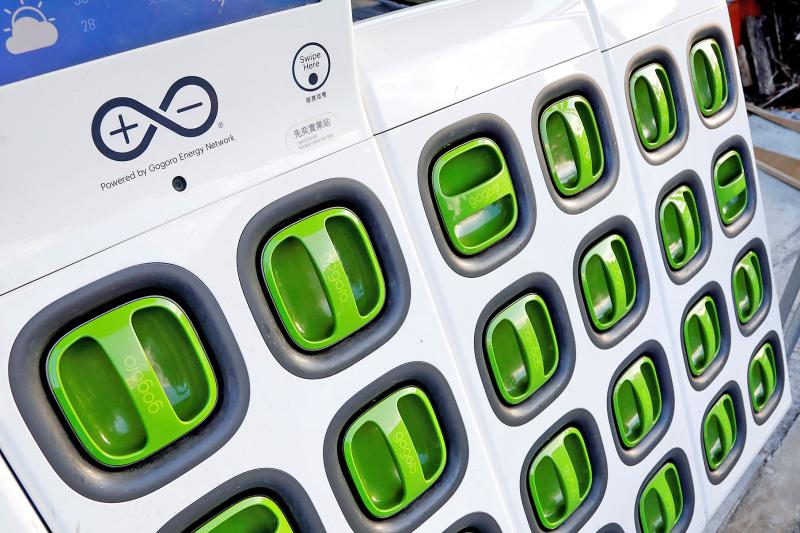Electric scooter maker Gogoro Inc (睿能創意) this year expects its number of electric battery swapping stations to outstrip the number of gas stations in the nation following seven years of deployment, a sign that electric two-wheelers are gaining traction.
As of the end of last year, Gogoro had built 2,215 GoStations nationwide, mostly in urban areas, up from 1,937 in 2020.
The number of gas stations operated by CPC Corp, Taiwan (台灣中油) and Formosa Petrochemical Corp (台塑石化) was 2,487.

Photo: Tyrone Siu, Reuters
“By the end of this year, we are very confident that the number of battery swapping stations will surpass the number of gas stations nationwide,” Gogoro vice president for energy services Alan Pan (潘璟倫) told a news conference yesterday.
Gorogo aims to deploy more large-scale electric battery swapping stations, dubbed Super GoStations, and other stations in collaboration with government agencies, Pan said.
The company also plans to add battery stations in more remote areas, he said.
Gogoro’s 453,300 riders can swap batteries at GoStations located in 7-Eleven convenience stores, and even one in Nantou County’s Wuling (武嶺) on Hehuanshan (合歡山), the highest highway in Taiwan.
New vehicle sales by Gogoro and its partners in the Powered by Gogoro Network (PBGN) contracted 5.2 percent year-on-year to 93,999 units last year, outperforming the overall scooter market, in which sales plunged 21.9 percent year-on-year.
PBGN members include Yamaha Motor Co, Aeon Motor Co (宏佳騰), Motive Power Industry Co (摩特動力) and Suzuki Motor Corp.
Gogoro chief product officer Peng Ming-i (彭明義) expects new electric vehicle sales to return to growth this year.
The penetration rate of electric scooters is also forecast to climb this year, compared with 11.6 percent last year, up from 9.6 percent in 2020.
Peng declined to provide further forecasts ahead of Gogoro’s debut on the US market.
Gogoro, Yamaha, Aeon and Suzuki are scheduled to launch new models later this year, which would also provide growth momentum.

South Korea’s equity benchmark yesterday crossed a new milestone just a month after surpassing the once-unthinkable 5,000 mark as surging global memory demand powers the country’s biggest chipmakers. The KOSPI advanced as much as 2.6 percent to a record 6,123, with Samsung Electronics Co and SK Hynix Inc each gaining more than 2 percent. With the benchmark now up 45 percent this year, South Korea’s stock market capitalization has also moved past France’s, following last month’s overtaking of Germany’s. Long overlooked by foreign funds, despite being undervalued, South Korean stocks have now emerged as clear winners in the global market. The so-called “artificial intelligence

NEW IDENTITY: Known for its software, India has expanded into hardware, with its semiconductor industry growing from US$38bn in 2023 to US$45bn to US$50bn India on Saturday inaugurated its first semiconductor assembly and test facility, a milestone in the government’s push to reduce dependence on foreign chipmakers and stake a claim in a sector dominated by China. Indian Prime Minister Narendra Modi opened US firm Micron Technology Inc’s semiconductor assembly, test and packaging unit in his home state of Gujarat, hailing the “dawn of a new era” for India’s technology ambitions. “When young Indians look back in the future, they will see this decade as the turning point in our tech future,” Modi told the event, which was broadcast on his YouTube channel. The plant would convert

‘SEISMIC SHIFT’: The researcher forecast there would be about 1.1 billion mobile shipments this year, down from 1.26 billion the prior year and erasing years of gains The global smartphone market is expected to contract 12.9 percent this year due to the unprecedented memorychip shortage, marking “a crisis like no other,” researcher International Data Corp (IDC) said. The new forecast, a dramatic revision down from earlier estimates, gives the latest accounting of the ongoing memory crunch that is affecting every corner of the electronics industry. The demand for advanced memory to power artificial intelligence (AI) tasks has drained global supply until well into next year and jeopardizes the business model of many smartphone makers. IDC forecast about 1.1 billion mobile shipments this year, down from 1.26 billion the prior

People stand in a Pokemon store in Tokyo on Thursday. One of the world highest-grossing franchises is celebrated its 30th anniversary yesterday.